Archive for July, 2009
CHILDHOOD REVISITED – FERNGULLY: THE LAST RAINFOREST
Posted by kjohnson1585 in Animation, Childhood Revisited, Film, Uncategorized on July 26, 2009
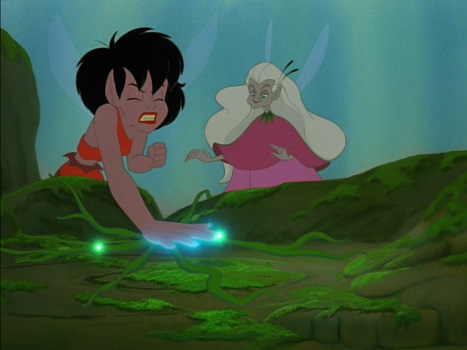
Fairies, apparently, go number 2 from their hands.
FERNGULLY: THE LAST RAINFOREST – (1992)
Director: Bill Kroyer
Starring: Jonathan Ward, Samantha Mathis, Robin Williams, Tim Curry, Christian Slater
Screenplay by: Jim Cox
Before driving hybrid cars, going green, and buying “carbon offsets” were cool—and let’s be honest, are they really?—the on-again, off-again environmental movement would sometimes pop into the limelight with some sort of life-changing book, eye-opening documentary, or in the case of FernGully, a harmless but thought-provoking film. Heavy-handed, opinionated cinema is certainly no new thing: see John Q, The China Syndrome, The Life and Times of David Gale. Unlike those, however, this one clearly is aimed at the younger crowd.
Here’s a little interesting trivia: Jim Cox, the screenwriter, also wrote for The Rescuers Down Under. Sounds to me like someone has an obsession with Australia! Shrimp on the Barbie! Fosters! Former British prison colony! Well, that’s certainly the perfect country/continent to depict the best that our planet has to offer. By the way… does Australia even have rainforests? I thought the literal definitely of rainforests defined them as being only located along the tropical regions.
NOSTALGIC LENS: Even though I saw this movie several times, I don’t remember a lot about it. I’m not a hundred percent that I ever just sat down and watched the movie all the way through. Like so many movies, I most likely watched parts of it here and there, and ended up piecing the film together. Did I like it, though? I don’t think I did. It’s certainly not in the region of my brain that hosts my most cherished memories.
DOES IT HOLD UP: And I can see why. I had to get up halfway through the movie to do something else; that’s how much this movie grated on me. I haven’t felt such a “moronic pandering” feeling since watching Happy Feet (which, by the way, is a good-looking yet horrible film). By that, I mean that not only is the movie’s message blatantly obvious, but it tries so hard that it’s embarrassing.
The 90s, as I mentioned in my Teenage Mutant Ninja Turtles post, was shameless in its desire to pander to teenagers, and this one is no exception. The, uh, region (district?) of FernGully hosts a rich cornucopia of flora and fauna—also, magic fairies. Specifically, half-naked fairy Crysta is our star; she shirks her magic lessons with the old and wise Magi Lune to do what I assume is the “going to third base” version of the fairy world with hunk o’ magic meat Pips.
During your typical early-90s, “look at how amazing our animation is” intro sequences, Crysta orgasmically explodes out past the canopy of the trees, which is forbidden, and sees smoke. (She doesn’t know what smoke or fire is. Damn fur’ners.) What’s causing the smoke? Why, it’s the MAN-made machine, the evil Leveler, that’s just cutting down trees for, I guess, shits and giggles. Curious, as fairies are wont to be, she goes exploring.
The Leveler is an absolutely ridiculous mechanical vehicle; if something like that actually did exist, I’d be more impressed by that than the supposedly natural beauty of the rainforest. It would be badass if it wasn’t wholly impractical. It cuts trees, picks them up with ease, chops them up AND trims them into plywood boards, and stacks them on a table. A TABLE! Inside the machine. I assume the entire thing is attached to Wal-Mart, where people also can walk into this thing and buy the pieces.
The Leveler’s only flaw seems to be it can only cut the trees marked with a red X, and Zak, who I assume is the same Zak from “Saved by the Bell,” is “dat city boi” charged with the task. Crysta inadvertently saves him from a falling tree by shrinking him, and after some clarification and goofy banter, the two are off on a tiny adventure.
I should mention the typical comedy sidekick (ugh) is a bat named Batty (Ugh!) voiced by Robin Williams (UGH!!!). An escaped winged mammal from some scientific experiment, he loathes humans because they tortured him and gave his brain basic cable. He fills the movie with his typical annoying quips (although I will admit that one or two of them made me chuckle). And he busts out a mean freestyle.
Tone Loc, however, schools Batty without even trying in a delicious Big-Lipped Alligator moment.
But the winner, hands down, is Tim Curry as the evil Hexxus, singing Toxic Love in such an over-the-top way that it’s actually goddamn excellent:
Oh, Hexxus is an escaped monster that was trapped in a tree but was released when the Leveler cut it. He took over the machine to attack FernGully. Magi dies to give all the fairies some power they hardly use. Zak and Christy and Batty get together and solve personal conflicts to beat it. I mean, all that is metaphoric filler, really, since the main message is clearly a pseudo-spiritual mantra for kids, that they too “have the power within” to save their environment.
It’s not that effective though. The animation isn’t quite solid, especially compared to the previous Disney films I’ve featured. It’s good at some spots, but god-awful in others. I also like how in some scenes, fairies just appear out of nowhere. Zak also doesn’t seem to mind too much that he’s been shrunk. He does for a little, but he shrugs it off in an attempt to get some fairy tang. If it’s slender and has boobs, guys will go for it.
The line readings are the worse, though. Williams is probably one of the better ones, if only because he sounds like a cartoon character anyway. Ward is forgettable, and Mathis is just worthless. How worthless? She also played the ranger in Broken Arrow (a stupid but at least decent-actiony film) and, worse, Princess Daisy in the Super Mario Bros. movie (a future Childhood Revisited feature, one I’m eager to attack viciously). The winner here is Tim Curry, if because he voices Hexxus with such a devil-may-care, just-for-the-paycheck attitude that it’s actually incredible.
And now, because I loved it so much in the movie, here is my attempt to mimic Tim Curry’s laugh as Hexxus:
It’s the third best laugh in the world, behind Mark Hamill’s The Joker laugh and Tex Avery’s laugh in such cartoons as “Bad Luck Blackie.”
IN A NUTSHELL: It’s silly, although it never seems to push into the territory of absolute revulsion. While I had to step out the room—I’m rather sensitive to overt-message movies—I think a lot of people would probably be able to stomach it and find something enjoyable here. Not to say I didn’t find some good moments: Tim Curry and a few zingers on occasion made me smile. (If you want a solid, less overt environmental message movie, watch Over the Hedge.)
PLEASE NOTE: THERE’S A CHANGE UP ON THE SCHEDULE DUE TO ME WANTING TO WATCH CORALINE AND WATCHMEN, WHICH WERE RELEASED ON DVD LAST WEEK!!
August 3rd: The Adventures of Little Nemo
August 10th: Tiny Toon Adventures: How I Spent My Summer Vacation
CHILDHOOD REVISITED – DICK TRACY
Posted by kjohnson1585 in Childhood Revisited, Comics, Film, Uncategorized on July 19, 2009
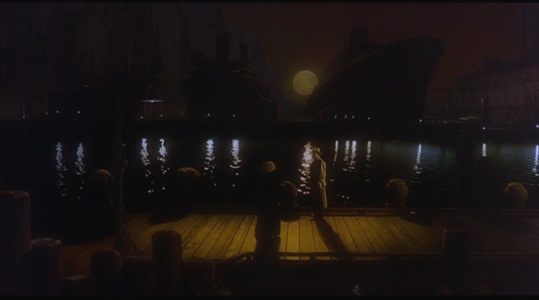
INSERT DICK JOKES HERE. HAHA, I SAID INSERT
DICK TRACY – (1990)
Director: Warren Beatty
Starring: Warren Beatty, Al Pacino, Dustin Hoffman, Madonna
Screenplay by: Jim Cash, Jack Epp Jr.
It takes a real badass to wear bright colors in public and get away with it. Steve Harvey can do it. Pimps can do it. But the original ass-kicking, gangsta-punching detective, Dick Tracy, rocked the yellow trenchcoat way before it was (ironically) cool. Chester Gould debuted this comic back in 1931, and it’s still referenced to this day. Dick was a symbol of good in a world of corruption and grotesque criminals whose crimes matched, albeit metaphorically, the deformities of their physical appearance.
Dick Tracy also introduced a high level of violence in his comics, among other unique features, such as actual investigations, forensic discoveries, serious dramatic relationships, and a rich backstory of character developments. Still running till this day in certain newspapers, the franchise reached a pinnacle of sorts with the release of this film during the first wave of comic book movies in the earlier 90s—back when campy was considered the only way to produce them (see Batman, Phantasm, The Shadow, The Rocketeer, etc.)
NOSTALGIC LENS: I’m kinda excited. I’m entering the list of films that I hardly remember, so I’m pretty much watching this for the first time. All I remember is Flattop and Itchy (Itchy was my favorite, although I distinctly remember being disappointed that Itchy hardly scratched himself in the film), bright colors, and a sweet shootout in the end, where everyone is killed. Oh, yeah, this movie was pretty hardcore back then.
DOES IT HOLD UP: Somewhere in this movie is a good movie. It wants to be good. It needs to be good. I liked a lot of it truth be told. But there are some parts that are just god-awful and flat-out stupid. Imagine hanging out with some friends, and you’re having a great time, laughing and socializing, and one of them says the most fucked-up thing you’ll ever hear. Everyone stops laughing and the mood is completely killed. But at least you can start up the awesome again.
You can tell the kind of movie this will be in the first ten minutes (apologies to the horrid French over-dubbing—it’s the only version I could find):
After a vicious massacre by Flattop and Itchy, the mood is killed by a bizarre moment when Dick is called into the scene from an opera, glances at the damage, then returns to the opera. What!? And the line readings during Tess (Dick’s girlfriend) and Dick’s walk down the street are ridiculously campy. I mean, the movie is campy overall, but that scene is just way in outer space (which is ironic, since Dick Tracy did have an outer space story arc in the comics.)
Luckily (or strangely), things start to calm down as the movie progresses, and becomes at the very least a normal-campfest. Dick is caught between catching the bad guy (a hilarious Big Boy played by Al Pacino) at all costs, staying within the confines of the law, and his dual attraction between Tess and Breathless (and taking care of The Kid, AKA, Dick Tracy Jr.). The movie is much easier to swallow at this point, but there are still a lot of missteps.
I blame Beatty, clearly an inferior director trying to tackle something so monumental. He’s inconsistent in stylistic choices, and isn’t particularly keen on fixing the mistakes in the screenplay. He lets everything just play out whether it makes sense or not. The back-and-forth edits between Breathless’s singing and Dick’s action scenes aren’t good at all, although the montages with Breathless’s songs overdubbed are much better (the songs themselves are also very good, so that helps). Sound cues are just terribly done, as if they screwed up during shooting, and had to be dubbed in later by an incompetent sound studio (why is Dick and Tess so distinctly heard when the camera is 500 feet away from them? How much does it cost for an echo effect?)
The worse scene for me had to be when Dick saves someone from “the bath” (being covered in cement within a box.) He opens the box to save him. Cut to the bad guys coming after them. Cut back to Tracy—who for some reason put himself in the box. Tracy is now covered in cement and his gun doesn’t work! Well, fuck, you should have thought about that before you jumped to the wet cement. A creepy character called No-Face saves him, though.
So, the movie fails there, but succeeds in others. Big Boy tries to choreograph a Breathless dance number, which is hysterical, since he only slaps her, bumbles around and just gets in the way. Dick and The Kid have some rather poignant scenes together, and after that street scene, Dick and Tess have their moments too. The criminals are sufficiently monstrous, with Flattop stealing the show just by being a sadistic murderer.
Heck, when the plot gets going, it gets going pretty well, with a delightful number of setups and double-crosses, bribes and backstabbing, and even a sweet ass, well-done fame job of Tracy. But for all those great moments, as mentioned, some stuff just makes you cringe. I rolled my eyes pretty hard when Big Boy’s bugged room is exposed by—get this—a spilled cup of coffee. There’s also an odd scene where Dick has to climb down from a building, even though it’s rather unclear how the hell he got up there in the first place. And I don’t even want to discuss the inanity of the see-saw scene.
Hey. Hey. Hey, hey, hey. You know who was surprisingly good though? Madonna. I knooooooooooow. Actually, sarcasm aside, Madonna kind of showed a bit of decent acting chops in this film and A League of Their Own, and here, she’s the only one (aside from the other side characters) to understand the right tone of campiness needed, especially to play a femme fatale such as herself. Warren Beatty, on the other hand, never seems to quite get a grip on Dick. When he’s not just kicking ass and taking names, Dick kind of flounders, stutters around Tess, and pointlessly stares at pictures of cars and No-Face sketches. Although, to be fair, I think it’s mainly done to reflect how terrible Tracy is at desk jobs. I just didn’t think he’d be THAT terrible.
But he kicks crazy ass in the climax:
Don’t worry, that’s not a spoiler.
IN A NUTSHELL: This movie is a roller coaster of awesome and fail, a back and forth inconsistent film filled with as many great moments as there are terrible ones. I didn’t like this more, nor did I hate it… I just strung along for the ride. Please, if there is any Dick Tracy fans out there, drop some knowledge on me and the rest of the comment board.
July 27th: FernGully: The Last Rainforest
August 3rd: An American Tail
LEAVE MICHAEL ALONE!
Posted by kjohnson1585 in Film, Uncategorized on July 16, 2009
LEAVE MICHAEL ALONE!
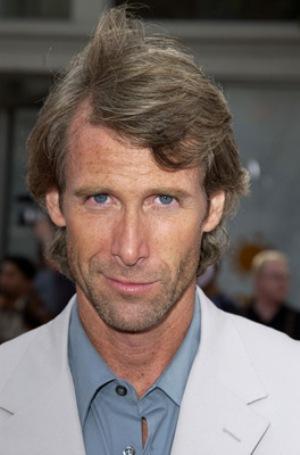
You're not helping with that douche-bag smile.
Michael Bay has officially reached “hate for the sake of hating” status. He shall claim his award along side Dane Cook and Carlos Mencia and Stephenie Meyer at some point to be determined later.
Don’t get me wrong. Much of the hate is warranted. His movies are overly bombastic, erratic, and overly straightforward in the most clichéd and inane ways possible. Immature. One-dimensional. Style with no substance.
And yet, I feel obliged to at least defend him in some way, something I thought I would never do in all my years. Why? Well, part of the reason is this somewhat harsh review on one of my childhood favorite films. I love that website, and I agree with a good chunk of what the author said, but I can’t help but feel it’s just another drop in the post-hate diatribe wave on Michael Bay before he became MICHAEL BAY. Bad Boys was one of his earliest films, and it’s a lot of fun without the inanity of masturbation jokes that fill Transformers. But, more on that in a second.
As the title implies, I also think that the combination of critic dislike and nerd rage has pushed Bay past the point of generic director who likes explosions to the epitome of everything that’s wrong about Hollywood and the demise of humanity as we know it (an award I’d give to Shyamalan, but I digress). The purpose of this piece is essentially to try and wean off some of the unadulterated hate on Bay with a hopefully less-biased argument, beyond simply writing it off as “mindless entertainment.” I’m not trying to get him into heaven, just not send him to hell. I’ll be Henry Fonda. Let’s see if I can convince the rest of the jury.

And boom goes the dynamite.
Bay’s obsession with explosions is nothing new. Nor are explosions themselves. Action movies tend to utilize generic explosions for no reason because it puts the hero up against a cinematic timer. Stopping the villain isn’t enough. You gotta get the hell out of there.
The explosion is the 80s and 90s version of Hitchcock’s “bomb under the table” argument for good suspense. Action movies ratchet up the suspense angle to incredible degrees—we know whodunit, so now it’s just life-versus-death. In this case, the bomb has gone off, and it’s more akin to a “fireworks within the buildings” argument, as applied to such films. There’s nothing inherently wrong with them, really, and although Bay uses them so often, he doesn’t use them as much as everyone claims. His movies usually have one major one, with some minor ones here and there. Of course, they’re complimented with a lot of destruction in the forms of car crashes, demolitions, and insane shootouts. Excessive, yes. Mindless, yes. Contextually, though, they work, since upping the ante is important to a credible climax, the perfect satisfaction for something high-geared anyway. I love Die Hard, but you would be hard-pressed not to admit the endings to all four of them are rather weak, when compared to the intense action that occurs prior to them. (Even the first one—though it’s still a damn cool ending.)

The word "bromance" didn't exist back then.
The criticism leveled towards Bay’s machismo heroes and sexualized females is warranted. Imagine Fast and the Furious, times a million. Wait. Let’s imagine Fast and the Furious. Seems to utilize the same idealization of male/female roles, and in my opinion, makes them worse, by dumbing them down into the fetishization of illegal street racing. Bay isn’t doing much different than that. Catering to the lower common denominator isn’t new, and to pretend we as a society should always expect great cultural significance from a medium that certainly doesn’t require it (especially from him) is bonkers. Remember when everyone said they’d like fresh, healthy choices at their local fast food restaurant, and then no one ate them? We talk a good game, but we certainly won’t practice it. So why are we pretending Bay played off this idealization first, despite the fact that we’ve been getting forms of this during the 50s? Saying “that’s all he does” is true, but irrelevant. You may claim that Hitchcock played with the ideas of fetishizing male/female dynamics, but the fact that he verbally abused his female leads doesn’t exactly vibe well. “He did it for intellectual purposes” is not a good excuse.
Another thing to consider is that one can’t really take the buddy-action-comedy film to any greater length other then to devise some off-note conflict between them that’s eventually solved by the final reel as they dispatch the main bad guy. In the case of Bad Boys, in particular, Martin Lawrence and Will Smith clearly had such a great chemistry together that I think it’s impossible to imagine it any other way. And straight-laced Connery vs. goofy-as-always Cage in The Rock was truly a lot of fun. Say what you will about their comedy (I loved it, personally), but they certainly didn’t clash, like say, Keenan Ivory Wayans and Steven Segal.
And besides, he doesn’t write these things. He influences them a lot, sure, but it’s the screenwriters who put that nonsense on paper.
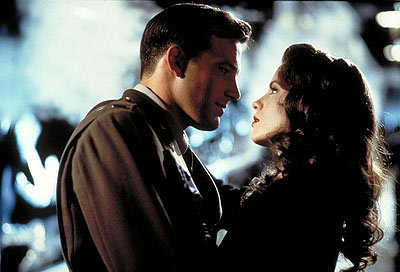
My favorite part was when they cut to the credits.
Okay. I will accept all the dislike on Bay to a certain extent, but the editing criticism is one I absolutely disagree with. Bay’s so-called frantic, unclear, and nonsensical editing/cutting is dead wrong. I have never seen a Bay movie where I was completely befuddled to the continuity of the action. Hell, I was more confused watching Batman Begins and the Bourne movies than any of Bay’s high-intensity flicks. I’m not even sure where this complaint came from.
Editing isn’t much discussed or understood outside film/TV circles, so I’ll keep this simple. There are basically two types of editing: classical Hollywood style, which is what everyone is used to, which makes cuts between moments so smooth and seamless that you’re not supposed to notice them; and there’s Sergei Eisenstein’s style, a film theorist who not only popularized the concept of the montage back in the 1920s, but theorized that editing is not about being invisible but striking—the cuts should be noticeable, and should impact the viewer as much as the scenes themselves.
I doubt Bay is even aware that film existed earlier than 1980. But what I’m arguing is that even if his films don’t make sense to the average viewer in terms of continuity, the impact that those cuts cause must mean something on a visceral level. Bay’s editing is geared where each individual character has a “moment” to succeed at some point, before cutting hard to the next character, and so on. It’s sloppy but effective in the Eisenstein way, and it’s not as if action, horror, or disaster movies aren’t adverse to that idea, like in, again, Batman Begins and the Bourne movies (Terrence Malick films are prone to that style, too).
Besides, I’ve seen worse editing before. Check out this scene from Bad Boys:
Makes sense to me. Now, check out this retardedly high-intense-cut nonsense from Something’s Gotta Give (apologizes for making you watch any part of this movie):
Ugh. That just makes me cringe.
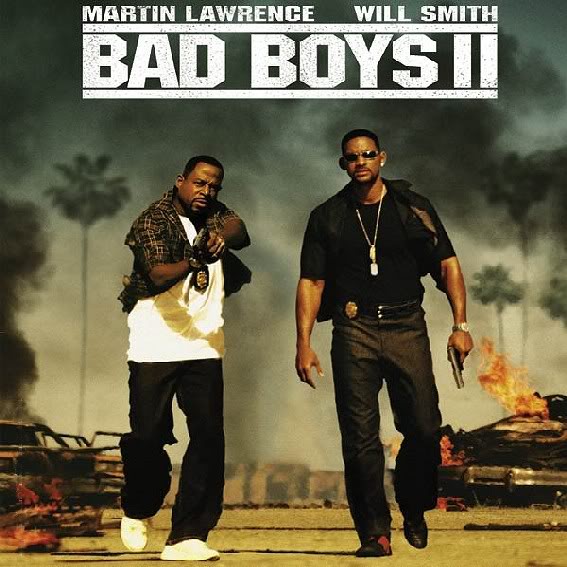
Well, at least the soundtrack was decent.
I must emphasize that this isn’t a defense on Michael Bay. His movies are nice for a quick netflix pickup—a one-and-done kinda deal. And to be honest, there does seem to be at least a modicum of semi-appreciation for The Rock, a little less for Bad Boys, and even less-but-still-present for Armageddon. But I don’t think the utter amount of vitriol he gets is necessary. With these two things in mind, one thing is clear: Bay, please go back to making R-rated movies. PG-13 is holding you back. We need more great lines like “Losers whine about doing their best. Winners go home and fuck the prom queen.”

